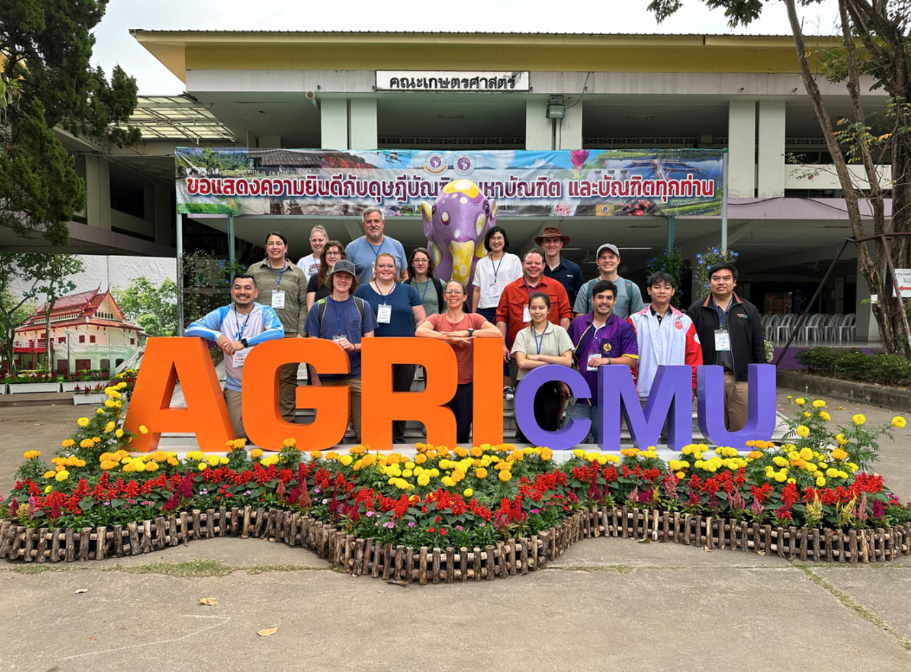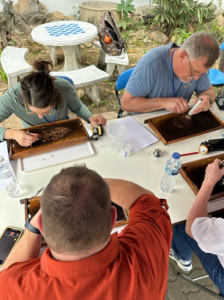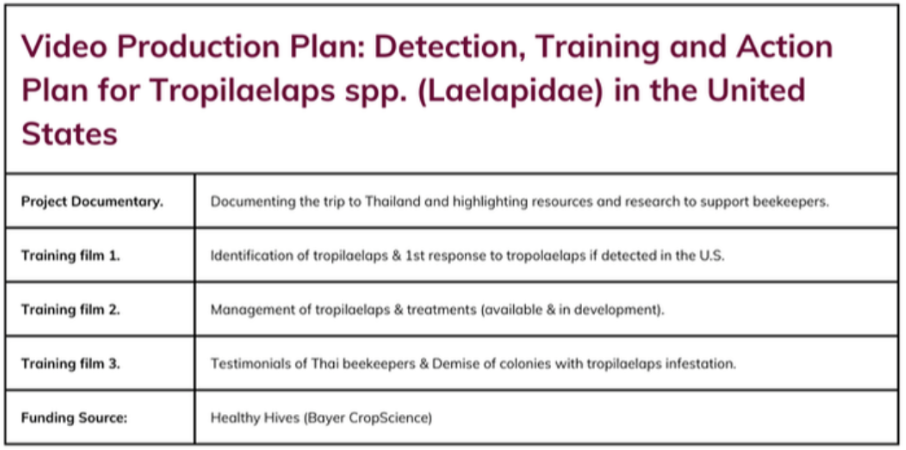
[ad_1]
Auburn College & Apiary Inspectors Kick Off 2024 Tropilaelaps Coaching Grant With Profitable Thailand Journey.
This work is made attainable with Nationwide Honey Board and North Dakota Dept of Agriculture funding administered by Mission Apis m., and in-kind assist from Auburn College, Chiang Mai College, and Apiary Inspectors of America.

Thailand coaching individuals and hosts outdoors Chiang Mai College’s College of Agriculture posing for a bunch picture.
Background
Within the U.S. the Western honey bees, Apis mellifera, have been devastated by varroa mites, which jumped from the Asian honey bee species Apiscerana many a long time in the past and arrived within the U.S. within the ‘80’s. Given the historical past and impression of the Varroa mite to the U.S. beekeeping trade, a rising concern amongst beekeepers, researchers, and apiary inspectors is the potential risk and impression of latest rising parasitic mites within the genus Tropilaelaps.
Tropilaelaps developed as a parasite of one other Asian honey bee, Apis dorsata. Like Varroa, some Tropilaelaps species – Tropilaelaps mercedesae and Tropilaelaps clareae – additionally jumped to Apis mellifera a number of a long time in the past when Apis mellifera was launched to Asia. Each Varroa and Tropilaelaps mites parasitizing Apis mellifera, are ectoparasites that feed on brood, inflicting injury and eventual colony collapse if left unmanaged.
Tropilaelaps mercedesae is the species of main concern; it’s reported to be spreading all through Asia and surrounding geographies, however has not been detected in North America. The place each mites – Varroa and Tropilaelaps – are current in a hive, administration by beekeepers in Asia focuses on the Tropilaelaps mite as a result of they reproduce quicker than Varroa and are very damaging to colonies in a shorter period of time. If the unfold and institution of Tropilaelaps continues alongside worldwide commerce routes, then the introduction, subsequent outbreak, and eventual institution of those mites might happen from coast to coast inside the U.S.
In North America, most state or territories are liable for managing a significant honey bee pest or illness outbreaks. Nonetheless, some states and territories do not need honey bee regulatory frameworks for mounting a response, and/or lack the required assist to implement a response. Given the absence of a federally managed, nation-wide apiary inspection program, the Apiary Inspectors of America (AIA) performs a number one position in making a nationwide framework to deal with rising threats to the apicultural trade.
Collectively, AIA members kind a non-profit worldwide group at present representing 35 United States and Canadian provinces and territories that regulate the well being and motion of over 3.8 million honey bee colonies (USDA, 2022 Census of A.g). AIA members work together with a whole bunch of hundreds of beekeepers every year. Consequently, AIA is the nationwide authority on honey bee well being and on the frontlines of managing honey bee pest and pathogen outbreaks, and is essential to disseminating related details about the elements impacting honey bee well being. To assist their efforts, Mission Apis m. has granted funding from the Nationwide Honey Board, in partnership with the North Dakota Division of Agriculture to a collaborative challenge, led by Dr. Geoffrey Williams from Auburn College.

Coaching participant (Mike Studer, Apiary Inspector for Tennessee) performing the bump check – which is the usual APHIS illness survey methodology to detect Tropilaelaps – on colonies parasitized by the mite. Photograph by Dr. Geoffrey Williams.

Coaching individuals (Alyssa Piccolomini, State Entomologist for Montana, Mike Studer, Apiary Inspector for Tennessee, and Kim Skrym, Apiary Inspector for Massachusetts) uncapping brood cells to watch creating tropilaelaps mites. Photograph by. Dr. Geoffrey Williams.
 Forward of the arrival of this parasite, this grant goals to tackle the crucial activity of creating a well-informed proactive response to the rising risk of Tropilaelaps, with key federal colleagues to offer apiary inspectors with probably the most up-to-date details about Tropilaelaps, coaching on methods to establish grownup mites and appropriately monitor dwell honey bee colonies within the discipline, and to create a assist community that may permit members to share this scientifically backed data and instruments with different inspectors, beekeepers, and the general public. The primary of those trainings was just lately hosted by Dr. Bajaree Chuttong at Chiang Mai College in Thailand, the place Tropilaelaps may be noticed. A second observe up occasion will likely be hosted by Dr. Williams at Auburn College within the USA.
Forward of the arrival of this parasite, this grant goals to tackle the crucial activity of creating a well-informed proactive response to the rising risk of Tropilaelaps, with key federal colleagues to offer apiary inspectors with probably the most up-to-date details about Tropilaelaps, coaching on methods to establish grownup mites and appropriately monitor dwell honey bee colonies within the discipline, and to create a assist community that may permit members to share this scientifically backed data and instruments with different inspectors, beekeepers, and the general public. The primary of those trainings was just lately hosted by Dr. Bajaree Chuttong at Chiang Mai College in Thailand, the place Tropilaelaps may be noticed. A second observe up occasion will likely be hosted by Dr. Williams at Auburn College within the USA.
“We’re comfortable to report that the Thailand coaching was informative and yielded many invaluable property for the U.S. beekeeping Trade to construct coaching supplies from!”
Moreover, Mission Apis m., with funding from the Wholesome Hives analysis program, despatched Wonderstone Movies on the Thailand journey to doc the coaching and create a public-facing documentary in addition to three coaching movies associated to identification, administration, and impacts of this parasite. These are anticipated to be prepared in direction of the top of 2024.
 By: Danielle Downey (PAm.), Dr. Geoff Williams (Auburn College), and Grace Kunkel (PAm.)
By: Danielle Downey (PAm.), Dr. Geoff Williams (Auburn College), and Grace Kunkel (PAm.)
Learn the unique article right here: https://www.projectapism.org/pam-blog/thailand-training
[ad_2]